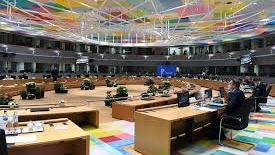
Italy and Germany block central green deal legislation
The European Commission has scraped a key piece of Green Deal legislation following political shifts within the European Parliament. The move came after Italy, governed by a far-right administration of Georgia Meloni, aligned itself with the European People's Party (EPP) on the matter.
The legislation in question, the Green Claims Directive, was proposed by the Commission in 2023 as part of the broader EU Ecodesign Directive. Its aim was to ensure that companies accurately disclose the environmental impact of their products and refrain from making unsubstantiated claims about sustainability or environmental friendliness. The directive would have applied both to products that interact directly with the environment—such as electrical appliances—and to those marketed using vague or unsupported “green” claims.
Italy’s change in voting position, led by Prime Minister Giorgia Meloni’s party, shifted the majority within the European Parliament, aligning with the EPP’s preference to allow both large and small businesses to continue certain greenwashing practices. As a result, a blocking minority has now formed in the EU Council of Ministers, backed by Germany, Italy, and several smaller member states.
Following this development, EU Environment Commissioner Jessika Roswall withdrew the legislative proposal. Although sources in Brussels have indicated the move could be legally contested, the Commission does not expect any formal challenge during its current mandate, which runs until 2029. Roswall stated that including small and medium-sized enterprises (SMEs) in the directive would not align with its original intent.
The Green Claims Directive was designed to enable EU consumers to make informed choices based on transparent and accurate environmental information, and to counteract misleading public relations claims. For companies operating in the industrial biotechnology sector, the ability to credibly promote clean alternatives to fossil-based products is central to their market positioning.
The decision to halt the directive reflects the Commission’s current trajectory, which appears to deprioritise climate protection amid ongoing geopolitical challenges—despite frequent rhetorical commitments to the contrary. The directive was seen as integral to achieving the EU’s environmental and climate objectives.
The move of the EC is a significant setback for the industrial biotechnology sector, which has received billions of euros in public funding over the past several years. Companies such as Finland’s Solar Foods—a pioneer in cellular agriculture—and Germany’s AMSilk, which manufactures compostable synthetic fibre alternatives using recombinant spider silk, have demonstrated the environmental superiority of their products over fossil-derived disposable goods through extensive life cycle assessments.
The decision may signal that EU policymakers are less inclined than their counterparts in the United States and China to seize the economic opportunities presented by the green industrial transformation. Under its current five-year plan, China is investing several billion US dollars in the development of relevant biotechnological processes. In 2023, the US Senate commissioned a report from the National Security Commission on Emerging Biotechnology, which called for a US$15bn federal investment and closer collaboration with industry to counter China’s growing leadership in the field. China has been pursuing a strategic investment agenda in biotechnology for over two decades. In late June, the new UK government will make a decision on its investment into engineering biology, an important part of industrial biotech.
“There is time to act but no time to wait,” said Michelle Rozo, Vice Chair of the NSCEB, at BIO 2025, the world’s largest biotech conference. “The United States needs to remain in the lead in biotech.” She added: “This is not about where medicines are made. This is about who controls the intellectual property, the infrastructure, the supply chains, the innovation that is really going to shape the world in the 21st century.”
In mid-May, the European Biosolutions Coalition renewed its call for a comprehensive EU Biotech Act and for increased public investment to build large-scale production capacity in Europe in order to preserve the bloc’s competitiveness in biotechnology.
Click here to add your own text


 Afyren Group
Afyren Group Adobe stock Photos - hkama
Adobe stock Photos - hkama  Phabioc GmbH
Phabioc GmbH